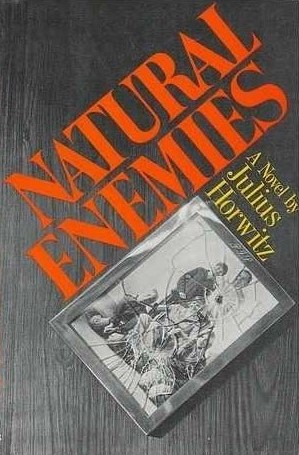 By JULIUS HORWITZ (Holt, Rinehart & Winston; 1975)
By JULIUS HORWITZ (Holt, Rinehart & Winston; 1975)
This taut and compact first person shocker is simply one of the most disturbing novels to emerge from the 1970s (a decade that produced no shortage of disturbing fiction). Intellectually grounded yet unerringly suspenseful, NATURAL ENEMIES can be viewed as an upscale TAXI DRIVER, and has lost none of its winsome power in the ensuing decades. A Hal Holbrook headlined movie adaptation appeared in 1979, but this horrific tale’s full effect is contained in its present form.
Paul Steward is a wealthy Connecticut based magazine publisher who wakes up one morning resolved to kill his family and himself. His reasons for this are made clear over the course of the ensuing day, which Paul, who relentlessly examines and reexamines his mental state as only a severely repressed New York intellectual can, is determined will be his last. He’s disappointed in his clinically depressed wife, who has grown apart from him, and his three kids, who haven’t lived up to his hopes for them, but Paul’s desire to end their lives actually stems from misguided compassion: he wants to protect them from the overwhelming despair he deals with each day.
Paul goes about his daily ritual of taking a two hour train ride into New York City. In his downtown office he meets with an astronaut and holocaust survivor whose respective article pitches, focusing on the loneliness of outer space and the appallingly casual nature of evil, only serve to heighten Paul’s depression.
It’s during Paul’s lunch break that the novel’s unforgettable centerpiece occurs: a wild orgy with five prostitutes that gives the proceedings a lurid, sleazy core (which didn’t make it into the overly refined film adaptation). Yet like most everything else in Paul’s life this sexcapade inevitably turns sour, devolving into a sad group encounter session during which Paul bears his fractured soul to the uncomprehending gals. There follows an equally unpleasant phone conversation with his wife Miriam and a lengthy discussion with a psychiatrist pal that yields no solutions to Paul’s problems. Not even a desperate tryst with a lonely woman on his train ride home sways Paul from his murderous course of action.
About the final pages I’ll reveal that there are a couple genuine surprises, but don’t get your hopes up too high, as the overpowering bleakness of the rest of the book is followed through to the end—and beyond.
